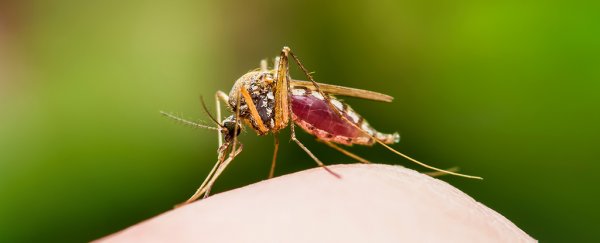By releasing specially bred mosquitoes that can't transmit viruses, scientists have been able to virtually eradicate dengue fever from the city of Townsville, Queensland, in north-eastern Australia – and they say the same methods could be scaled up and used elsewhere too.
Lead by the World Mosquito Program (WMP), the scheme used mosquitoes infected with Wolbachia bacteria. It's estimated that the bacteria naturally occurs in anywhere between 25 and 70 percent of all insects – but it's not found in the Aedes aegypti mosquitoes that can pass dengue fever (or yellow fever) to humans.
That's important because Wolbachia interferes with the workings of the dengue fever virus, apparently without otherwise harming the mozzies.
After introducing the bacteria into the A. aegypti population, researchers have seen local cases of dengue fever drop to almost nothing over the past four annual rainy seasons in Townsville.
Crucially, they say there's been no detectable environmental impact, either.
 Wolbachia introduced into mosquito eggs. (World Mosquito Program)
Wolbachia introduced into mosquito eggs. (World Mosquito Program)
For an invasive species like A. aegypti, which is so good at adapting to environments populated by humans, that's a major result.
"At a cost of around AU$15 [about US$11] per person, the Townsville trial demonstrates the approach can be rolled out quickly, efficiently and cost effectively to help provide communities ongoing protection from mosquito-borne diseases," says one of the team, WMP director Scott O'Neill.
"It lays the foundation for future deployments in larger cities, globally, where we're targeting a reduced cost of US$1 per person."
The process works using A. aegypti mosquito eggs, specially engineered to contain Wolbachia bacteria, that are then released into the wild in a carefully managed roll out. Buckets of these eggs, food, and water are left in specific spots and monitored.
Trials first began in 2011, but this is the first city-wide experiment. Since 2014, around four million mosquitoes have been released in Townsville across an area of 66 square kilometres (25.5 square miles).
 School children have been helping out. (World Mosquito Program)
School children have been helping out. (World Mosquito Program)
Even local schools have been getting in on the study, with kids and parents encouraged to contribute with their own "Mozzie Box" packs – kits containing mosquito eggs, food, and instructions for releasing them into the wild.
That local community support and backing has been crucial in the success of the program, the researchers say.
Since the Wolbachia roll out began, only four local cases of dengue fever have been identified. Only one of those was in a Wolbachia-covered area, and even that had an "uncertain" place of origin, the scientists say.
Compare that to 54 local cases reported the season before the scheme began, and a median average of 98 since 2001, and you can see the change.
Dengue fever incidents are still occurring in Townsville, but it seems they're now almost exclusively down to foreign travellers arriving in the area.
The next step is to run more trials in different locations and see if the same effects can be achieved. Using mosquito-breeding techniques like the ones used in Townsville, diseases like Zika and malaria could also be eradicated – though that's still some way off.
For now, Yogyakarta in Indonesia is next on the team's list, where a randomised controlled experiment will compare areas where the Wolbachia bacteria is introduced into the mosquito population with areas where it isn't.
One remaining question is whether the bacteria will stay in the majority of mosquitoes long after the scientists have left the scene. However, after seven years of work in Townsville and no sign of Wolbachia going away, the signs are good.
"We're wanting to have a really major impact on disease," O'Neill told Sarah Boseley at the Guardian. "For dengue and Zika nothing's working at the moment for control."
"Nothing we've got is slowing these diseases down – they are getting worse. I think we've got something here that's going to have a significant impact and I think this study is the first indication that it's looking very promising."
The research is awaiting peer review but is available to read online.
